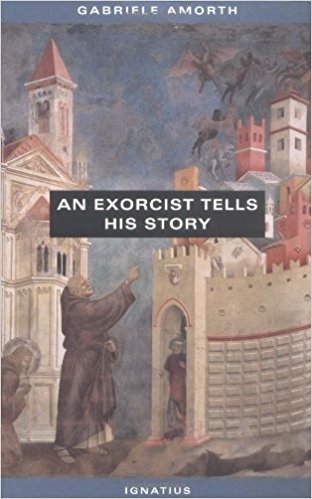Fr. Gabriele Amorth served as the exorcist of in the diocese of Rome for many years. Though lately known more by hyperbolic click bait articles based on out-of-context remarks about Harry Potter and yoga, the man shows an impressive degree of level-headedness in his writing. Exorcism was Fr. Amorth’s day job, and he writes about it with all the matter-of-fact calm a doctor might have while delivering a lecture about getting your flu shot every year.
And this is the chief purpose of his book, An Exorcist Tells His Story. Though we do get an occasional account of a particularly extreme case, Amorth’s focus is on the “average” experience of an afflicted person and the everyday things a person can do to protect or free him/herself of various forms of affliction. It reads more as a primer on the types of demonic affliction, common ways or reasons why people are afflicted and what a normal person can do with this knowledge. He is quick to point out that true demonic affliction is extremely rare. Nine times out of ten, the person is actually experiencing a mental health issue, and unless a person has deliberately sought out demons in occult practices, the afflicted has often done nothing to cause the affliction. The book also has first-hand accounts of people who suffered from curses or oppression or possession by demons. It was fascinating to read what they went through and how they found solace in God’s protection.
I found this book surprisingly comforting. Despite all he has seen – or perhaps because of all he has seen – he remains confident in God’s power over all other powers in this world. I left the book feeling as though worrying about demons makes less sense than worrying about getting cancer. Worrying about it doesn’t do anything to cause or prevent it. It just makes you stressed. But if the idea of demons still bothers you, I’ll leave with Amorth’s advice: attend mass, participate in the sacraments of the church and above all, go to confession. According to Amorth, a good confession is stronger than any exorcism anyone could give.
This is the exorcism book for people who are scared of exorcisms. It could also be the book for non-Catholics even mildly curious about exorcists, demons, and the like. This is not a book for horror fans looking for a fun jump scare.
Any non-Catholic reader will find this an entertaining curiosity. Though Amorth does extol the graces of the sacraments, he doesn’t preach or try to sway with emotional or overly bombastic language. He does expel misconceptions and gives a straightforward account of his very unusual day job. I would recommend this book to any reader of any faith who is even remotely curious.



